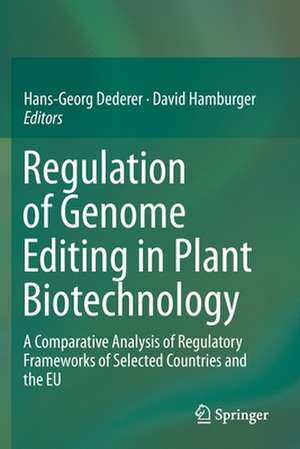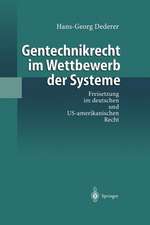Regulation of Genome Editing in Plant Biotechnology: A Comparative Analysis of Regulatory Frameworks of Selected Countries and the EU
Editat de Hans-Georg Dederer, David Hamburgeren Limba Engleză Paperback – 29 aug 2020
This book provides in-depth insights into the regulatory frameworks of five countries and the EU concerning the regulation of genome edited plants. The country reports form the basis for a comparative analysis of the various national regulations governing genetically modified organisms (GMOs) in general and genome edited plants in particular, as well as the underlying regulatory approaches.
The reports, which focus on the regulatory status quo of genome edited plants in Argentina, Australia, Canada, the EU, Japan and the USA, were written by distinguished experts following a uniform structure. On this basis, the legal frameworks are compared in order to foster a rational assessment of which approaches could be drawn upon to adjust, or to completely realign, the current EU regime for GMOs. In addition, a separate chapter identifies potential best practices for the regulation of plants derived from genome editing.
| Toate formatele și edițiile | Preț | Express |
|---|---|---|
| Paperback (1) | 1003.24 lei 6-8 săpt. | |
| Springer International Publishing – 29 aug 2020 | 1003.24 lei 6-8 săpt. | |
| Hardback (1) | 1009.40 lei 6-8 săpt. | |
| Springer International Publishing – 29 aug 2019 | 1009.40 lei 6-8 săpt. |
Preț: 1003.24 lei
Preț vechi: 1223.47 lei
-18% Nou
Puncte Express: 1505
Preț estimativ în valută:
191.96€ • 200.100$ • 159.23£
191.96€ • 200.100$ • 159.23£
Carte tipărită la comandă
Livrare economică 09-23 aprilie
Preluare comenzi: 021 569.72.76
Specificații
ISBN-13: 9783030171216
ISBN-10: 3030171213
Pagini: 372
Ilustrații: XI, 372 p. 34 illus., 19 illus. in color.
Dimensiuni: 155 x 235 mm
Greutate: 0.54 kg
Ediția:1st ed. 2019
Editura: Springer International Publishing
Colecția Springer
Locul publicării:Cham, Switzerland
ISBN-10: 3030171213
Pagini: 372
Ilustrații: XI, 372 p. 34 illus., 19 illus. in color.
Dimensiuni: 155 x 235 mm
Greutate: 0.54 kg
Ediția:1st ed. 2019
Editura: Springer International Publishing
Colecția Springer
Locul publicării:Cham, Switzerland
Cuprins
FM.- Introduction: Regulation of plants derived from genome editing - What Lessons to be learned from other countries?.- Regulation of Genome Editing in Plant Biotechnology: Argentina.- Regulation of Genome Editing in Plant Biotechnology: Australia.- Regulation of Genome Editing in Plant Biotechnology: Canada.- Regulation of Genome Editing in Plant Biotechnology: European Union.- Regulation of Genome Editing in Plant Biotechnology: Japan.- Genetic Engineering in the United States: Regulation of crops and their food products.- Comparative Analysis: The Regulation of Plants Derived from Genome Editing in Argentina, Australia, Canada, the European Union, Japan and the United States.- Appendix.
Notă biografică
Hans-Georg Dederer is full professor of Constitutional and Administrative Law, Public International Law, European and International Economic Law at the University of Passau (Germany). His fields of research include international environmental law and agricultural biotechnology law. He is also a member of the Permanent Senate Commission on Genetic Research of the German Research Foundation (Deutsche Forschungsgemeinschaft - DFG)
David Hamburger is a Ph.D. candidate at the Chair of Constitutional and Administrative Law, Public International Law, European and International Economic Law at the University of Passau (Germany) and holds a LL.M. degree from the University of Glasgow. As part of a project funded by the German Federal Ministry of Education and Research (BMBF), he is conducting research on the international aspects of the regulation of plants derived from genome editing.
Textul de pe ultima copertă
This book provides in-depth insights into the regulatory frameworks of five countries and the EU concerning the regulation of genome edited plants. The country reports form the basis for a comparative analysis of the various national regulations governing genetically modified organisms (GMOs) in general and genome edited plants in particular, as well as the underlying regulatory approaches.
The reports, which focus on the regulatory status quo of genome edited plants in Argentina, Australia, Canada, the EU, Japan and the USA, were written by distinguished experts following a uniform structure. On this basis, the legal frameworks are compared in order to foster a rational assessment of which approaches could be drawn upon to adjust, or to completely realign, the current EU regime for GMOs. In addition, a separate chapter identifies potential best practices for the regulation of plants derived from genome editing.
Caracteristici
Presents the first comprehensive analysis of the regulation of genome editing Includes detailed information on the regulation of genome editing in Japan Provides a valuable point of reference for lawmakers and researchers around the globe


















